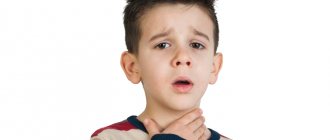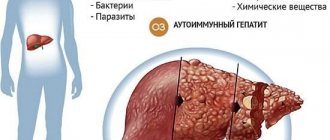Mechanism of disease development
Acute laryngitis is an inflammation of the mucous membrane of the larynx. The larynx is located in the front region of the neck. It connects the pharynx to the trachea and performs three vital functions:
- sound-producing (the vocal apparatus is located in it);
- respiratory;
- protective (prevents food and foreign particles from entering the trachea).
Under the influence of a number of factors (hypothermia, overstrain of the vocal cords, allergies, infectious diseases, etc.), the mucous membrane of the child’s larynx becomes inflamed. As a result, a sharp dilation of blood vessels occurs, edema develops, the lumen of the glottis narrows (or completely closes), speech function is impaired and breathing becomes difficult.
Anatomy of the larynx
The larynx is a complex organ, which is a complex of various tissue structures with a developed network of blood, lymphatic vessels and nerves.
The larynx is a hollow air-carrying organ, which is given rigidity by cartilage. The larynx opens from above into the laryngopharynx, and from below it passes into the trachea.
Inside, the larynx is covered with a thin mucous membrane of cylindrical ciliated epithelium, and in places of mechanical load (epiglottis, posterior wall of the larynx, free edges of the vocal folds) with more durable stratified squamous epithelium.
The skeleton of the larynx consists of 5 main cartilages:
- three unpaired (cricoid, thyroid and epiglottis);
- two paired (arytenoid cartilages);
The vocal folds are two muscular-ligamentous cords of a whitish-pearl-colored color.3
The larynx provides a number of important functions:
- respiratory
- phonatory (voice)
- protective
- cough
- expectorant
- speech-forming (it is based on respiratory and vocal functions)
Causes of acute laryngitis in children
In order for assistance to a child with acute laryngitis to be as effective as possible, you must first find out what caused the development of the disease. The main provoking factors include:
- ARVI, influenza;
- bacterial respiratory tract infections caused by pneumococcus, staphylococcus, streptococcus, hemophilus influenzae;
- complications after scarlet fever, measles;
- inflammation of the paranasal sinuses;
- local/general hypothermia of the body;
- inhalation of cold, smoky air;
- congenital weakened resistance of the respiratory tract;
- unfavorable environmental conditions;
- contact with allergens;
- uncontrolled use of sprays and aerosols for the throat, leading to a reflex spasm of the larynx in a child;
- overstrain of the vocal cords (strong screaming, loud singing);
- infectious diseases of the oral cavity;
- stress factors.
How to prevent the development of chronic laryngitis?
The development of chronic laryngitis is associated with prolonged neglect of the child’s health status. It is much easier to prevent the formation of a persistent focus of infection than to treat it for a long time. Preventive actions:
- Timely elimination of acute laryngitis (the main rule for preventing chronic inflammation).
- Maintaining immunity at a high level (both local and general).
- Adequate nutrition with sufficient vitamins and minerals.
- Avoidance of stress factors.
- Timely treatment of any diseases in the child.
- Prevention of ARVI and influenza during an epidemic.
Symptoms of acute laryngitis
In childhood, acute laryngitis develops quite rapidly. At an early stage of the disease caused by a virus, the child experiences:
- general weakness,
- nasal congestion,
- soreness,
- redness of the throat,
- painful swallowing.
In some cases, body temperature may rise to 38–39°C.
Further added to the above symptoms are:
- rhinorrhea (excessive mucus discharge from the nasal passages);
- dry barking cough;
- hoarseness or complete loss of voice.
Over time, during intensive complex treatment of laryngitis, the cough becomes more rare and productive, that is, accompanied by the discharge of sputum.
FAQ
How to treat laryngitis at home?
For uncomplicated acute laryngitis and in the first days of the disease, it is recommended:
- ensure vocal rest, eliminate whispered speech , in which the vocal folds become even more tense
- plenty of warm drinks: you can drink warm milk with soda, warm mineral degassed water, teas and fruit drinks
- if laryngitis is accompanied by inflammation in the throat, it is recommended to rinse with a solution of chamomile or calendula, as well as the use of sprays, solutions or tablets to treat the throat
- inhalations are the main method of treating laryngitis. Self-inhalation can only be done using saline solution. Other drugs for inhalation are prescribed exclusively by a doctor.
Is it possible to quickly cure laryngitis?
For acute catarrhal laryngitis caused by viruses, recovery is possible within a week. It is important to consult a doctor in time and not self-medicate so as not to worsen the condition.
What syrups and tablets can be taken for laryngitis?
The use of local drugs for the treatment of the throat in the form of lozenges, sprays and rinses is permissible only if laryngitis is caused by throat diseases. These forms of drugs do not directly enter the lumen of the larynx.
How to treat false croup in a child?
When the first symptoms of croup appear, you should call an ambulance.
Only a doctor will be able to assess the severity of the child’s condition, as well as determine further treatment and observation tactics. Outpatient observation and treatment is permissible only for grade 1 stenosis. Self-medication and the use of folk remedies are excluded in this case!
Complications of acute laryngitis in children
One of the most dangerous complications of acute infectious laryngitis, characteristic of early and preschool childhood, is stenosis (narrowing of the lumen) of the larynx. It is also called false croup or acute airway obstruction. This complication may be due to the structural features of the child’s respiratory tract. Most often it develops against the background of influenza, parainfluenza, adenovirus, measles infection or chickenpox.
When the space under the vocal cords swells, the lumen of the larynx narrows, acute obstruction of the airways occurs, and oxygen deficiency develops. Symptoms of laryngeal stenosis are:
- heavy wheezing,
- barking cough
- hoarseness or complete loss of voice,
- excessive excitement of the child,
- enlarged lymph nodes,
- increase in body temperature,
- the appearance of light dry wheezing.
If you notice these symptoms, you should immediately consult a doctor. But it’s better not to let this happen and start treating acute laryngitis on time.
Regional Children's Consultative and Diagnostic Clinic
Laryngitis is a viral disease that is transmitted by airborne droplets, which affects the mucous membrane of the larynx and vocal cords, most often affecting children under 6 years of age, due to the anatomical features of the structure of the cartilage of the larynx at this age. Due to the increasing frequency of allergic reactions and the emergence of new strains of viruses, laryngitis is diagnosed before a year. The disease is very dangerous for young children, as the inflammation occurs with severe swelling of the larynx and can lead to suffocation.
The disease in a child can be caused by viruses or bacteria, and can also develop due to hypothermia, allergies, trauma to the larynx, or due to severe stress. Sometimes laryngitis accompanies pathologies of the esophagus, duodenum, and stomach. The main cause of frequently recurring laryngitis is the imperfection of the immune system, which leads to frequent infectious diseases of the upper respiratory tract and a decrease in the overall resistance of the body. Thus, laryngitis in a child can recur several times during the cold season.
Signs of laryngitis in children
- hoarseness of voice;
- dry barking cough;
- sore throat;
- feeling of the presence of a foreign body;
- redness and swelling of the pharyngeal mucosa;
- shortness of breath, laryngeal spasms.
- most often appear at night: often the baby feels great during the day, but at night suddenly begins to choke and cough heavily. The temperature during laryngitis is not always elevated, and its readings rarely exceed 38 degrees. The exception is the development of the disease against the background of influenza or sore throat.
First aid for false croup (stenotic laryngitis)
If signs of false croup appear (barking cough, shortness of breath, lack of air), you must:
-call an ambulance
- place the baby in a semi-sitting position.
-remove tight-fitting clothing and provide fresh air.
— immerse the child’s feet in warm (closer to hot) water to improve blood flow to the feet. This will slightly reduce the swelling in your upper body.
- inhalation solution through a nebulizer with saline. solution, inhalation and with glucocorticosteroid preparations.
A special drinking and eating regimen is required. During the period of illness, the baby should not abuse sweets, soda, refined and heavy foods. The drinking regime for laryngitis is plentiful, and the preferred drinks are warm teas, still mineral water, and milk.
If possible, during illness, the child’s conversations should be limited. The air in the room is made as humid as possible, for which purpose ventilation is used and special household appliances are turned on. If laryngitis is severe, the baby is hospitalized in a hospital.
Prevention of laryngitis in children
Prevention of laryngitis in children helps to avoid this disease and the serious complications that may arise.
-Teaching a child to a healthy lifestyle, playing any sport (be it gymnastics, running, swimming or dancing). It all depends on the preferences and age of the child. Hardening plays a decisive role in the body's resistance to viral infections. But remember, you can’t start hardening suddenly! In early childhood, hardening comes down to the fact that the child needs to be dressed for a walk outside depending on the weather. Small children should walk around the apartment not in socks, but barefoot. Breasts should take air baths for 20 minutes daily. Older children can douse themselves with cool water in the bath after bathing or take a contrast shower, which significantly strengthens the immune system and improves blood circulation throughout the body.
Proper nutrition plays an important role in improving immunity. To improve your child’s health, you need to include healthy foods and vitamins in his menu.
An adjusted diet, of course, does not guarantee that the virus will not enter the body, but it will help to more actively resist viruses and quickly cope with ARVI.
A child’s daily diet should include all the necessary vitamins, micro- and macroelements, and minerals. An unbalanced diet significantly reduces immune defense. The diet should be as varied as possible and consist of products of plant and animal origin.
-Local hardening of the throat - This is one of the methods for preventing inflammatory diseases of the pharynx when cold food or water gets into it, which is quite common in children (for example, eating cold ice cream in large pieces without parental supervision, licking snow while walking in kindergarten, etc. .). In a hardened child, the mucous membrane of the pharynx, hardened by cold, will not become inflamed and will not lead to illness, but an unhardened child may still get sick. It is necessary to gradually accustom the child’s throat to cold stress from almost one year of age. For example, instead of water at room temperature, give cool water to drink, start giving the child a little cold ice cream, etc.
Important! Carry out all the above procedures gradually!
-Taking antiviral drugs during the rise of viral diseases. For prevention during the peak of incidence, it is recommended to use antiviral drugs.
Diagnosis of the disease
Diagnosis of acute laryngitis is not particularly difficult. The diagnosis is based on the presence of acute respiratory infections symptoms, as well as hoarseness, shortness of breath, and barking cough. Call a doctor: he will listen to complaints, examine the child, measure the temperature, listen to the lungs and make a diagnosis.
Non-drug therapy
Treatment of acute laryngitis depends on the age of the child. This may include:
- compliance with bed rest;
- limiting vocal load (for 5–7 days it is better for the baby to remain silent or talk as little as possible);
- maintaining the optimal temperature (+18…+20°C) and air humidity (50–70%) in the room where the sick child is located;
- drink plenty of fortified drinks (the liquid should be warm and unsweetened);
- following a hypoallergenic diet - if there are symptoms of laryngitis, it is strictly not recommended for a child to give sour, spicy, too hot or cold foods and carbonated drinks.
When treating inflammation of the mucous membrane of the larynx, children are allowed to apply wet and dry warming compresses to the neck area and gargle with a warm infusion/decoction of chamomile or sage, if recommended by a doctor.
Drug therapy
How to fight infection?
Drug therapy for laryngitis that appears in a child against the background of an acute respiratory infection includes the use of antiviral and immunomodulatory drugs.
Antihistamines, which are usually prescribed for allergies, help relieve swelling of the mucous membrane and calm the baby. They should be given before bedtime, strictly according to the recommendation of the attending physician. What to do if you have a cough?
Remedies for this symptom are another essential component of treatment.
In the early stages of laryngitis, if a child has a dry hacking cough, drugs that block the cough center are used. Next, at the first signs of coughing, mucolytics are prescribed to thin the mucus and improve expectoration of sputum. Doctor MOM® cough syrup has similar properties. This complex herbal medicine, containing extracts of 10 medicinal plants, helps not only to liquefy mucus, but also to relieve swelling and inflammation. Herbal syrup is approved for long-term use in the treatment of laryngitis in children over 3 years of age. Actions at temperature.
If a child has a hard time tolerating a high temperature, he is prescribed an antipyretic. Treatment of laryngitis with antibiotics is justified only in the presence of serious bacterial complications and only as prescribed by a doctor.









